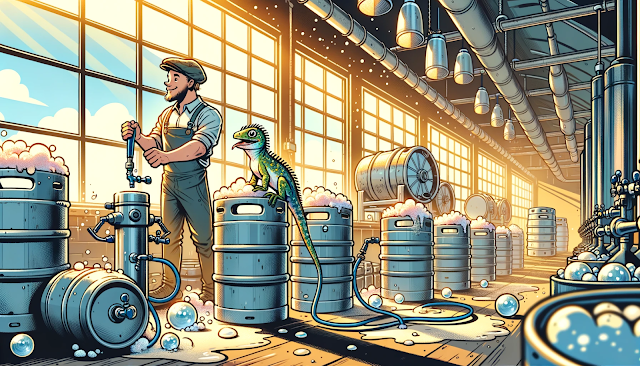Homebrewing beer has grown exponentially as a hobby, with enthusiasts continually seeking methods to refine their brewing process. One such method that has gained popularity, especially among those who keg their beer, is force carbonation. But what exactly is force carbonation, and why is it favored by many homebrewers?
What is Force Carbonation?
Force carbonation refers to the process of artificially introducing and dissolving carbon dioxide (CO2) into beer using a CO2 tank and regulator. This is in contrast to natural carbonation, where the carbonation is achieved by adding priming sugar to the beer, allowing yeast to consume the sugar and produce CO2 as a byproduct.
Merits of Force Carbonation in beer kegging
Consistency and Precision: Force carbonation offers a high degree of control. By adjusting the regulator on the CO2 tank, brewers can specify the exact volume of CO2 they want in their beer. This ensures consistent carbonation across batches and allows for tailored carbonation levels based on beer style or personal preference.
Speed: One of the most significant advantages of force carbonation is the speed at which beer can be carbonated. While natural carbonation might take weeks, force carbonation can achieve the desired carbonation levels in a matter of hours or days.
Reduced Risk of Over-carbonation: With natural carbonation, there's always the risk of adding too much priming sugar, leading to over-carbonation and, in worst cases, exploding bottles. Force carbonation eliminates this risk as CO2 levels are directly controlled.
Flavor Stability: Force carbonation avoids the introduction of additional sugars, ensuring that the beer's flavor remains unaltered post fermentation. This is particularly beneficial for beers where subtle flavors might be overshadowed by the residual sweetness of priming sugars.
Space Efficiency: When kegging and force carbonating, there's no need to store bottles for weeks while waiting for natural carbonation. This is especially beneficial for homebrewers with limited storage space.
Avoiding Sediment: Natural carbonation in bottles results in sediment at the bottom, a byproduct of yeast consuming the priming sugar. Force carbonation in kegs provides a clearer beer without this sediment.
Flexibility: Force carbonation allows for taste testing and adjustments. If a brewer feels the beer is under-carbonated, they can easily increase the CO2 levels. Conversely, if it's over-carbonated, they can release some pressure from the keg and adjust accordingly.
Potential Drawbacks
While force carbonation boasts numerous advantages, it's worth noting that the initial investment in equipment (CO2 tank, regulator, etc.) can be substantial. Moreover, there's a learning curve associated with achieving the perfect carbonation level. However, many homebrewers find that the benefits and the quality improvement in their beer more than justify the investment.
Concluding Thoughts
Force carbonation in kegging homebrew beer offers a combination of consistency, speed, and flavor preservation that natural carbonation struggles to match. It's a testament to the evolution of homebrewing, where traditional methods meet modern innovation. Whether you're a novice homebrewer or a seasoned veteran, considering force carbonation can elevate the quality and presentation of your beer, making each sip a testament to your craft.

